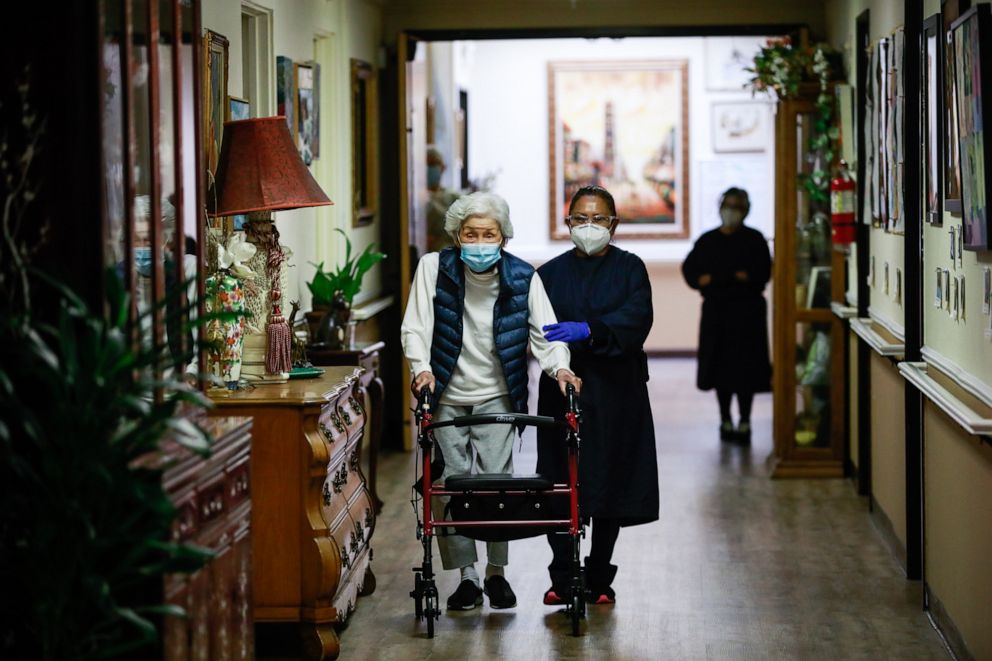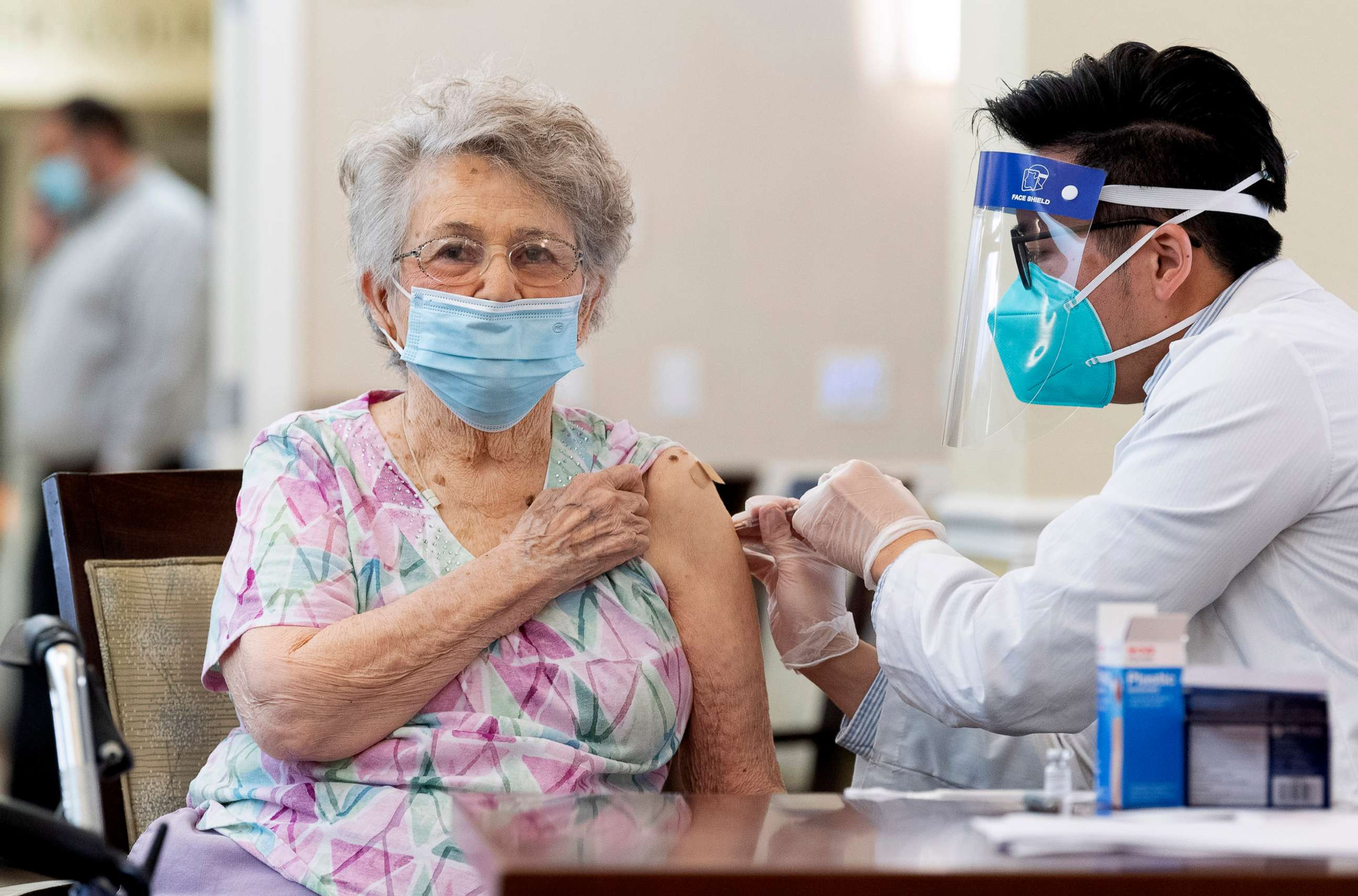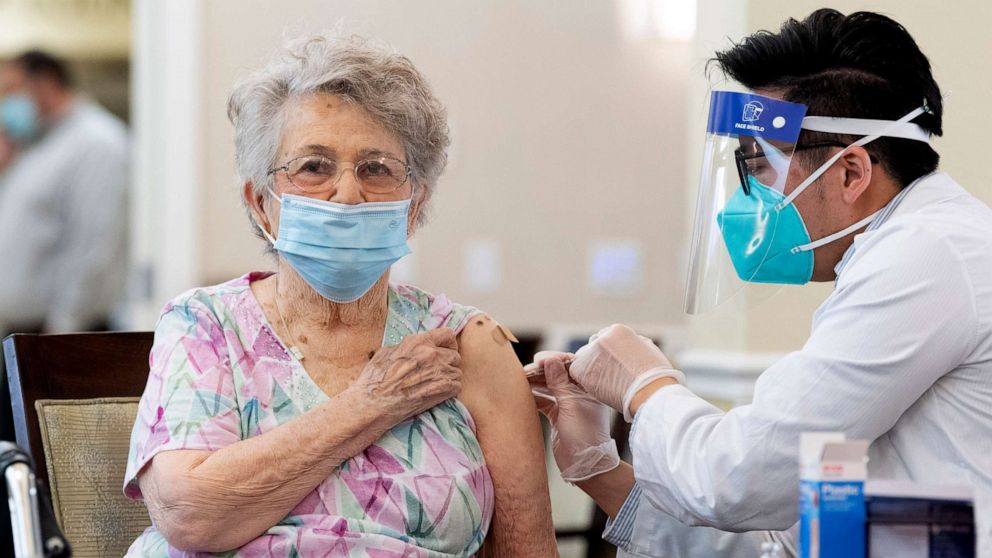As more nursing homes receive COVID-19 vaccine, relatives demand greater access to residents
Before the coronavirus pandemic, Marcella Goheen would visit her husband at a nursing home every day. As an essential care visitor, she would spend about 40 hours a week conducting neurotherapy and other assisted living tasks for her husband, who suffers from a neurodegenerative disability.
But as COVID-19 began to sweep through the halls of long-term care facilities across the nation, Goheen, along with thousands of family members of long-term care residents, was forced to accept strict visitor bans put in place to prevent the spread of the deadly virus.
Now, as vaccinations for the coronavirus are underway, families and eldercare advocates are wondering when they will be able to return -- and are worried about the impact of extended isolation.
"He needs me," Goheen said of her husband. "My daily visits included enabling him to move every 15 minutes because he cannot initiate the first step. The facility doesn't have the staffing to provide him with the care he requires, and seeing him through a screen is not enough."
The calculation for how to control access to nursing homes has not been an easy one, officials have said. Over the past year, congregate settings catering to the nation's most frail and elderly have become hot zones for the coronavirus. Nursing and assisted living centers have accounted for roughly 6% of the nation's COVID-19 infections but close to 40% of all deaths, according to state-by-state statistics monitored by ABC News.
Once public health officials realized that infections in surrounding communities were seeping into nursing centers, they moved quickly to advise facilities to shut themselves off from the outside world. In October, when the numbers had started to ease up, a nationwide ban on nursing home visitation was lifted. States were left to decide how stringent to make visitor restrictions going forward.
According to an American Association of Retired Persons website that tracks nursing home rules, visitation protocols now vary widely.
Vaccine distribution is only part of the equation for nursing homes as they try to balance the need to control the infection against the desire to open their doors more widely to friends and relatives. Julie Beckert, a spokesperson for ProMedica, one of the nation's largest residential nursing care providers with more than 300 nursing, assisted-living and hospice care facilities, said the company is continuing to weigh how much to relax visitation rules.
"Unfortunately, visitors may not get the vaccine for a while, and that can pose a risk of the virus coming into our centers," Beckert said. "So we continue to assess visitation and how we can safely address this very important part of the patient's and resident's recovery and well-being."

According to the AARP, every state is allowing some form of visitation in long-term care facilities. Most states are now leaving the level of access up to nursing homes management.
The patchwork of rules has bred confusion.
In Florida, indoor and outdoor visitation have been allowed since October, while in California, state guidelines allow limited indoor visits at facilities that have seen no new COVID-19 cases for 14 days. But in Los Angeles County, where coronavirus cases have recently surged, indoor visitation is still restricted, and outdoor visits are allowed but limited.
In New York, where Goheen lives, certain facilities now allow people to schedule visits during specified hours and on a limited basis. But at the nursing home where Goheen's husband lives in Manhattan, she is only permitted one visit a week.
As a result, Goheen sued the facility and the Metropolitan Jewish Health System to contest that policy, saying that isolation is now harming her husband more than the threat of the virus.
"The defendants' policies and practices have disallowed plaintiff from having a right to a dignified existence, self-determination and communication, as guaranteed by federal regulation," says the complaint, which was provided to ABC News.
Audrey Waters, a spokesperson for the nursing home, told ABC News that the facility recently agreed to a visitation plan with Goheen. She did not provide any details.
It is too early to know whether more families will follow suit, but Goheen’s lawyer told ABC News he believes there will be others looking to force nursing facilities to ease up.
Warren Norred, an attorney in Texas, said he has been approached by many families and is pursuing a similar case there.
"Isolation is what kills people," said Norred. "Your desire to live actually impacts your ability to live. And these residents in nursing homes need to see and hold their families to keep going."

Conditions have changed enough, Norred said, to allow for more leeway in congregate settings.
"We have testing, protective equipment and social distancing guidelines to allow families more time with their loved ones," he said.
At the heart of the argument is the assertion that isolation and loneliness can pose its own set of health consequences for nursing home residents and for residents living in assisted living facilities where vaccinations are falling behind.
"We know isolation leads to worse health outcomes," said Dr. Jay Bhatt, a practicing internist and ABC News contributor. "And as this grows, it can cause deconditioning, worsening of cognitive status, and higher risk of going to the hospital, with a domino effect happening."
A spokesperson for LeadingAge, the association of nonprofit providers of aging services, including nursing homes, told ABC News that even as vaccinations start to become universally available in nursing homes, the danger that social isolation poses to vulnerable residents remains a "very real health risk."
In Indiana, state senator Linda Rogers has introduced a bill to bolster the state's compassionate care guidance by allowing residents in nursing homes to receive visits from at least two designated caregivers during the pandemic. The bill would also require facilities to allow family members to visit if residents are showing signs of emotional distress.
"Throughout the COVID-19 pandemic, I have heard many heartbreaking stories about family members being unable to visit their loved ones in long-term care facilities," said Rogers in a statement to ABC News. "Isolation of our long-term care residents has detrimental impacts on their mental and physical health. They are unable to have the support and love they need from their family, and many spend the last days of their lives feeling alone and abandoned."
Goheen says continued restrictions against visitors in nursing homes are creating a new health crisis.
"Listen to the families," she said. "We deserve to see our loved ones. And we can do it in a safe way."
"I have a husband that needs me, and he's not alone," Goheen said. "There's a public health crisis happening right now, and it's called isolation."




